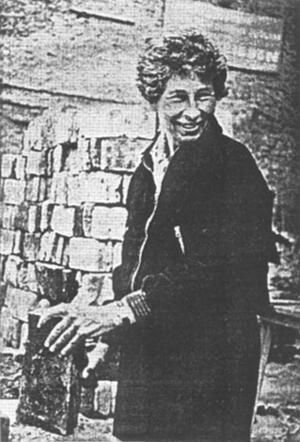Death of Soviet spy Ursula Kuczynski (Ruth Werner)
Ruth Werner, Soviet spy.
Courtesy of cia.gov
"I was not a spy," the woman known by the pen name Ruth Werner insisted years after her retirement. "I was never in the KGB. I was a member of the Red Army, in the reconnaissance service."
Whatever her name, however she would categorize herself, Werner was one of the most successful and secretive agents furthering the cause of socialism in the 20th century. She was born Ursula Kuczynski in Berlin on May 15, 1907 to a Polish Jewish family who supported the German Communist party—the British secret service MI5 had a KAEOT (“keep an eye on them”) file on her family as early as 1928.
She became a member of the party at 19, which resulted in her being immediately fired from her job at a publishing house. She met and married Rolf Hamburger, an architect, and the couple moved to Shanghai, where the party had told Werner that she would be contacted. She was approached by the German communist Richard Sorge, then the Soviet Union's spymaster in the Far East. She later described it as the "one event which was to prove decisive for my future life.” Sorge gave her the code name Sonja, and she joined a spy ring without her husband’s knowledge, storing weapons and hiding a fugitive Chinese comrade in their home. She also wrote articles for the German Communist newspaper Rote Fahne (Red Flag), using the pen name Ruth Werner.
She went to Moscow to receive training in using radio transmissions and Morse code, leaving her son Michael with in-laws in Czechoslovakia. Her training complete, she was assigned in February 1934 to Mukden, in the heart of turbulent Manchuria, which had been seized from China by the Japanese. Her superior was to be “Ernst,” a former German sailor, whom she had met at the radio training school in Moscow. The couple would later have a daughter, Janina, who was born in April 1936. After completing her work as a conduit between Russia and the Chinese partisans fighting the Japanese, Werner fled to Poland and later Switzerland.
Mixing the political with the personal once again, Werner’s handlers authorized her marriage to Len Beurton, an English communist who had fought bravely in Spain with the international brigades and whose British citizenship would allow Werner’s entry into England. In May 1941 Werner was able to make a rendezvous in London with “Sergej,” her new Red Army control. While living outside Oxford, she was introduced to Klaus Fuchs, another German political exile, who was working on secret British atomic research nearby. The two would meet to exchange stolen papers relating to the Manhattan Project research into the creation of the atomic bomb, which Werner would transmit to Moscow through her homemade radio set. In addition to Fuchs she ran other agents, including a Royal Air Force officer, a chemist, a specialist in submarine radar, Germans working for the American Office of Strategic Services, her brother Juergen (who had been hired by the U.S. Army’s Bureau for American Bombing Strategy), and even her father.
Moscow inexplicably broke off communications with her in 1946, and she lived in England until she found a coded message at a pre-arranged site telling her she could go to East Berlin. She buried her radio, bought four U.S. Army duffel bags and took Janina and Peter with her to West Berlin, proceeding by elevated train to the Soviet Sector. Len and her son Michael joined them in 1951. Returning to writing, she published some short stories, a biography of Olga Benario (a German communist who was gassed by the Germans in 1942), and her autobiography in 1991.
Twice awarded the order of the Red Banner, the highest Soviet military decoration, Werner also held the rank of colonel in the Red Army. She died in Berlin on July 7, 2000, aged ninety-three, survived by her four sisters, three children, and five grandchildren.
"I fought against fascism," she said later in life. "Whatever else, I can hold my head up high because of that." As for the friends she had made in England during her time there, she simply said, “I had friends, and they were good people. I didn't lie to them. I just didn't tell them what I was doing, that's all."
Sources: “Ruth Werner: Communist spy who passed the West’s atomic secrets to Moscow in the cause of fighting fascism,” The Guardian, July 11, 2000; “Ruth Werner, 93, Colorful and Daring Soviet Spy,” New York Times, July 23, 2000.




Read the book Bomb it has her in it its a amazballs
Read the book Bomb its amazballs it has her in it.